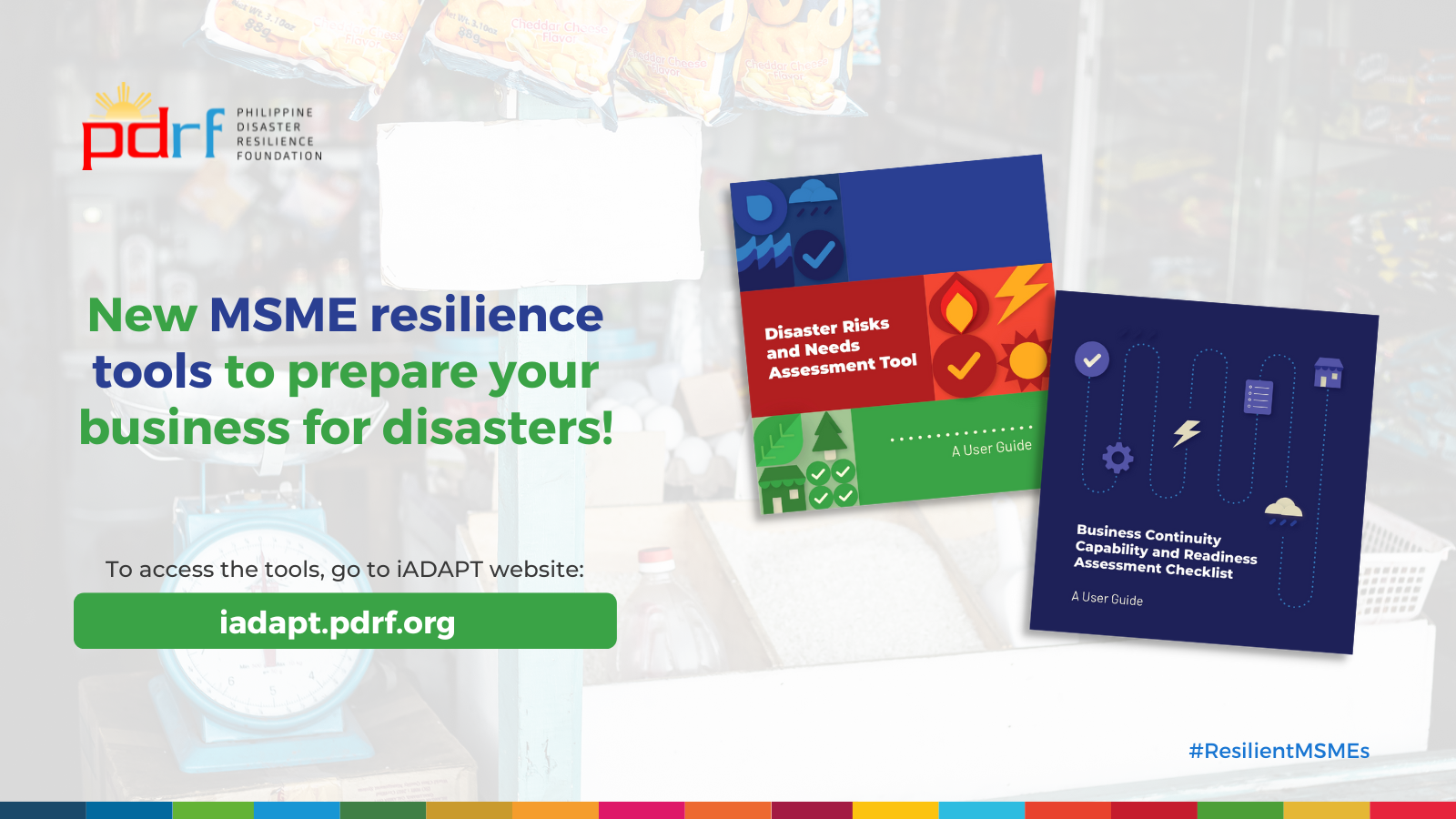Development of MSME Disaster Resilience Tools for the Philippines
PDRF, through the Philippine Preparedness Partnership (PHILPREP), developed tools to increase the awareness of MSMEs to prepare for, respond to, and recover from disasters in the Philippines thereby strengthening disaster resilience of MSMEs in the Philippines.
Description
Recognizing the significant role of micro, small, and medium enterprises (MSMEs) in the overall disaster resilience of the country, Philippine Disaster Resilience Foundation (PDRF), through the Philippine Preparedness Partnership (PHILPREP) developed tools that will cater to the needs of the business sector and will guide them in preparing for, responding to, and recovering from disasters.
PDRF developed these tools as part of the Asian Preparedness Partnership (APP) PHILPREP, the localized tripartite platform represented by the key societal actors from the government (Office of Civil Defense), the private sector (PDRF), and the civil society (Center for Disaster Preparedness). APP PHILPREP is supported by the Asian Disaster Preparedness Center (ADPC) and the Bill and Melinda Gates Foundation.
Inputs and activities required to develop these tools included project funding, technical writers, validation, and FGDs with MSMEs and MSME enablers on disaster resilience, project management and tool development. Through this, the Disaster Risks and Needs Assessment Checklist and the Business Continuity Capability Checklist were produced. The Disaster Risks and Disaster Preparedness Needs Assessment Checklist is designed for MSMEs to measure their vulnerability to disaster risks and ascertain their own needs in terms of knowledge, skills, and resources to avoid, reduce, or mitigate the impacts of disasters in their businesses. The Business Continuity Capability Checklist aims to help MSME owners and managers how to self-accomplish the business continuity capability and readiness assessment checklist.
Did the Sendai Framework change or contribute to changes in your activities/organization? If so, how?
As an alliance of businesses dedicated to building the disaster risk management capabilities of the private sector in the country, PDRF both contributes to and is guided by the Sendai Framework for Disaster Risk Reduction.
This project is also one of the good practices of ARISE, the Private Sector Alliance for Disaster the Private Sector Alliance for Disaster Resilient Societies. It addresses two ARISE commitments, namely, raising awareness with respect to disaster risk and mobilization of private sector, and sharing knowledge, experience and good practices amongst the private sector.
What led you to make this commitment/initiative?
What was your position before making this Voluntary Commitment / prior to the Sendai Framework?
MSMEs account for more than 99% of registered businesses in the Philippines and 67% of the workforce. They are the backbone of the economy and are also among the hardest-hit by disasters. Given their significant contributions, they play a crucial role in building back stronger.
MSMEs who wish to avail trainings on Disaster Risks and Business Continuity Planning need to sign up with the relevant government agencies or other DRR organizations. Oftentimes, these might take time, money and effort for the MSMEs, resources which they don't have that much luxury since they are busy managing their businesses. Other MSMEs might not be aware also of the importance of assessing their risks in terms of disaster and how having a business continuity plan in place can prevent or reduce losses for their business. Through the MSME Resilience Tools, which are available online at https://iadapt.pdrf.org/PHILPREPTools/, MSMEs can answer the checklists and they will know their risk and resilience index at the end of the tool.
Deliverables and Progress report
Deliverables
Deliverables are the end-products of the initiative/commitment, which can include issuance of publications or knowledge products, outcomes of workshops, training programs, videos, links, photographs, etc.
This Disaster Risks and Disaster Preparedness Needs Assessment Checklist is designed for MSMEs to measure their vulnerability to disaster risks and ascertain their own needs in terms of knowledge, skills, and resources to avoid, reduce, or mitigate the impacts of disasters in their businesses.
For MSMEs with an existing business continuity plan (BCP), the tool will serve as an internal audit and quality check regarding the contents, processes, procedures, and protocols observed by MSMEs in ensuring business continuity amidst the aftermath of a disaster.
For those MSMEs that do not have an existing Business Continuity Plan (BCP), the checklist will help them assess their readiness to come up with their own BCP and will also serve as a menu of protocols, procedures, and processes that they can adopt if these are not existing in the organization.
Organizations and focal points
Implementing Organization(s)
Focal points
If a VC's contact information has been hidden, the SFVC team can forward a message.Partners
